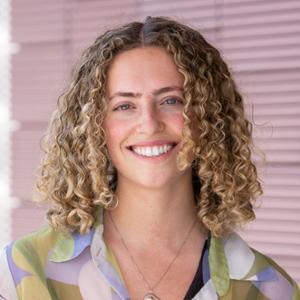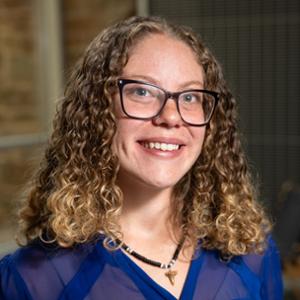
Sabina Feder ’25 and Brianna “Bri” Padilla ’25 both received Hamilton’s prestigious Bristol Fellowship, which sponsors projects “based on strong personal interest and commitment” and that “exhibit a spirit of inquisitiveness and a seriousness of purpose.”
Sabina Feder ’25
Major: Interdisciplinary studies / food studies
Hometown: New York, N.Y.
Feder, a food studies major, took classes in literature, anthropology, and environmental science to create her own interdisciplinary major at Hamilton and prepare for her project “Waste Not: Local Initiatives Against Global Food Waste.” She will visit New Zealand, the Bahamas, the Netherlands, and Sweden to gain “a better understanding of how different economic, social, and cultural environments shape people’s approaches to food waste interventions.”
Padilla will travel to Mexico, Australia, Indonesia, and Greece to explore the preservation of shark populations for her project “Fins for the Future: Global Shark Restoration.” A biology and studio arts double concentrator, Padilla will use her year abroad to “shape not only my understanding of shark restoration but also my broader approach to global issues.”
What sparked your interest in your chosen topic?
Brianna Padilla ’25
Majors: Biology and art
Hometown: Cooper City, Fla.
Padilla: Growing up in Florida, my deep connection with sharks began at age 7 when I rescued and raised a shark egg that I named Finnick. My passion for these creatures led me to acquire shark-themed items throughout my childhood, and I even “own” four sharks through a conservation program. This isn’t just a casual interest; I’ve actively studied sharks and learned about their vital role in marine ecosystems since I was old enough to understand. My passion for sharks and the ocean has inspired me to apply for and, gratefully, conduct this global shark restoration project.
Feder: I have been lucky enough to spend my four years at Hamilton studying food, specifically in the U.S. Food waste has always interested me — grocery stores are piled high with food that regularly goes to waste, subsidies can lead to excess corn production, and U.S. households generate 26.5 million tons of food waste every year. The food chain is incredibly global, and I am really curious to see how people around the world are finding local interventions and solutions.
What are some experiences at Hamilton that shaped your project?
Padilla: My first-year spring course The Marine Environment, taught by Visiting Assistant Professor of Geosciences Kristopher Kusnerik, sparked my interest in pursuing a project in this area. Hamilton’s Jeffrey Fund Science Internship supported my first experience conducting professional research with sharks with the Coastal Marine Education and Research Academy, and that definitely confirmed my project’s path. I am also truly grateful for Professor Katherine Brown’s consistent encouragement to pursue my aspirations, and her constant support inspired me throughout my Hamilton career.
Feder: Off-campus, I’ve been working at the Hope House in Utica for the past four years. A significant portion of the food they use comes from grocery stores and bakery surpluses, so it has really opened my eyes to how food would otherwise go to waste. The people I met there have shaped how I think about food and community, and I hope to carry the kindness and openness they have shown me into my project next year.
What are some challenges you might face while abroad?
Feder: One of the biggest challenges I will face is going from the strong, supportive community I have built at Hamilton to entirely new places. I’ve been lucky to spend the past four years with the most amazing friends, so it will be a big challenge to go from that environment to being on my own. However, I am very excited to push myself into unfamiliar spaces. I’m really excited to meet all the people I have spoken to online — they have all been welcoming, passionate, and I am looking forward to working alongside all of them.
What are you most looking forward to?
Padilla: I’m looking forward to the unexpected discoveries and challenges that will occur while navigating these diverse cultural landscapes, especially the chance to work directly with shark species I can’t encounter in the U.S. and to witness firsthand their crucial roles in varied marine ecosystems. The opportunity to build genuine connections with individuals from vastly different backgrounds who share a common goal of conservation is incredibly exciting. The prospect of directly observing and learning about the unique adaptations and ecological importance of these diverse shark species in their specific habitats is something I’m really looking forward to.
Fellowship Advising at Hamilton
Students interested in learning about the Goldwater Scholarship should contact Director of Student Fellowships Lisa Grimes.




